高中英语---形容词及其短语作状语
- 格式:doc
- 大小:63.50 KB
- 文档页数:11

高中英语语法复习天津市汉沽区第五中学刘华(一) 形容词、副词的作用与位置1. 形容词是用来修饰名词的,常被放在名词前作定语或放在系动词后面作表语。
He is a young man.He is young.2.副词则用来修饰形容词、动词、其他副词或者句子,一般位于形容词之前,动词之后或句子之首。
It’s very good.He runs fast.I’m very well.He has not been to Japan recently.以下属几种特殊情况,须牢记:1.形容词短语作定语,定语后置。
a language difficult to mastera leaning tower about 180 feet high2. 表语形容词(afraid , alike , alone , asleep, awake , alive 等)作定语,定语后置如a man alive有些表身体健康状况的形容词如well , faint ,ill 只作表语。
sick既可作表语又可作定语,ill 如作定语意为“bad” 。
3. 形容词用作定语,修饰不定代词通常后置。
Something important4. else 常用作疑问代词和不定代词的后置定语。
What else, somebody else.5. enough 修饰名词前置.I have enough money to buy this book .但enough 修饰形容词、副词时必须后置。
He runs fast enough.This book is good enough.6. 几个副词并列作状语时,其顺序较灵活,一般是:方式-地点-时间。
We had a good time together outdoors last Sunday.7. 频度副词often , always , usually 等放在be 之后、行为动词前。
He is always working hard.8. 副词作定语,定语后置。
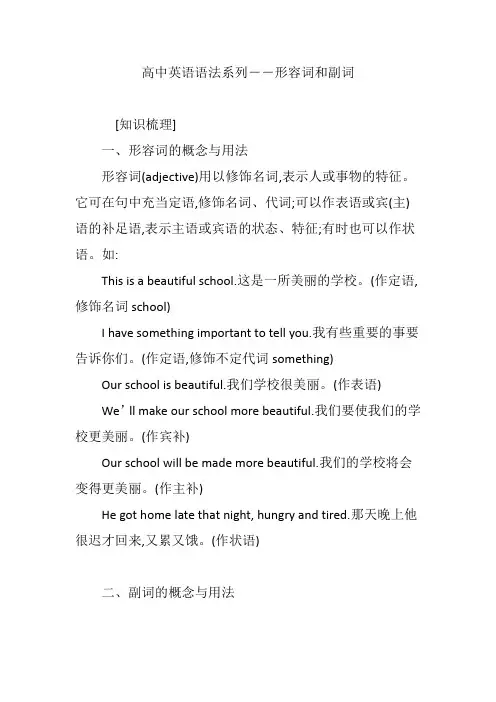
高中英语语法系列――形容词和副词[知识梳理]一、形容词的概念与用法形容词(adjective)用以修饰名词,表示人或事物的特征。
它可在句中充当定语,修饰名词、代词;可以作表语或宾(主)语的补足语,表示主语或宾语的状态、特征;有时也可以作状语。
如:This is a beautiful school.这是一所美丽的学校。
(作定语,修饰名词school)I have something important to tell you.我有些重要的事要告诉你们。
(作定语,修饰不定代词something)Our school is beautiful.我们学校很美丽。
(作表语)We’ll make our school more beautiful.我们要使我们的学校更美丽。
(作宾补)Our school will be made more beautiful.我们的学校将会变得更美丽。
(作主补)He got home late that night, hungry and tired.那天晚上他很迟才回来,又累又饿。
(作状语)二、副词的概念与用法副词(adverb)用以修饰动词、形容词或其它副词。
它在句中主要作状语,个别副词也可作表语、定语、或宾(主)语补足语。
He studies hard.他学习很努力。
(作状语,修饰动词)I’m terribly sorry for being late. 非常抱歉,我迟到了。
(作状语,修饰形容词)This coat fits him very well.这件上衣他穿着很合适。
(作状语,修饰副词)The people here are kind to us.这里的人对我们很好。
(作定语,修饰The people)When will you be back? 你什么时候回来?(作表语)三、形容词与副词的转换有的形容词加上ly后可转换成副词,规则如下:注意:friendly, motherly, lovely等词虽然以ly结尾,但不是副词,而是形容词。
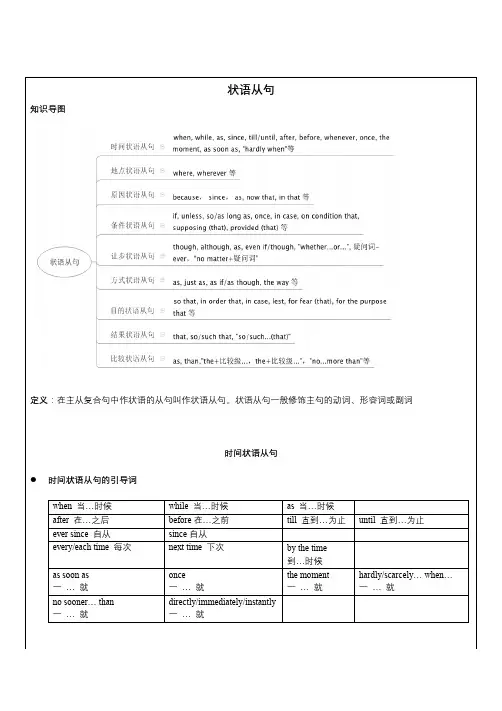
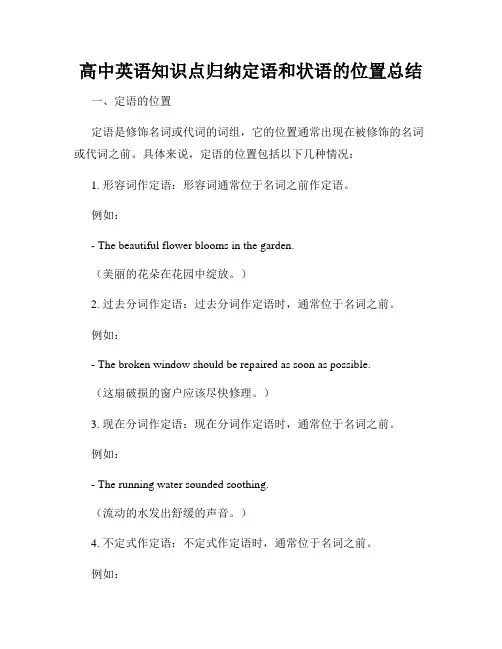
高中英语知识点归纳定语和状语的位置总结一、定语的位置定语是修饰名词或代词的词组,它的位置通常出现在被修饰的名词或代词之前。
具体来说,定语的位置包括以下几种情况:1. 形容词作定语:形容词通常位于名词之前作定语。
例如:- The beautiful flower blooms in the garden.(美丽的花朵在花园中绽放。
)2. 过去分词作定语:过去分词作定语时,通常位于名词之前。
例如:- The broken window should be repaired as soon as possible.(这扇破损的窗户应该尽快修理。
)3. 现在分词作定语:现在分词作定语时,通常位于名词之前。
例如:- The running water sounded soothing.(流动的水发出舒缓的声音。
)4. 不定式作定语:不定式作定语时,通常位于名词之前。
例如:- She has a lot of books to read during the summer vacation.(暑假期间她有很多书要读。
)5. 介词短语作定语:介词短语作定语时,通常位于名词之前。
例如:- The man in the black suit is my boss.(穿黑色西装的那个男人是我的老板。
)二、状语的位置状语是用来修饰动词、形容词、副词或整个句子的词组,它的位置可以灵活地放在句子中的不同位置。
具体来说,状语的位置包括以下几种情况:1. 状语放在句首:状语放在句首时,用来强调或引起注意。
例如:- In the morning, I usually go jogging.(早上,我通常去慢跑。
)2. 状语放在句中:状语放在句中时,用来补充说明或修饰动词、形容词或副词。
例如:- She spoke confidently during the presentation.(她在演讲过程中表现得很自信。
)3. 状语放在句尾:状语放在句尾时,用来总结、强调或表示结果。
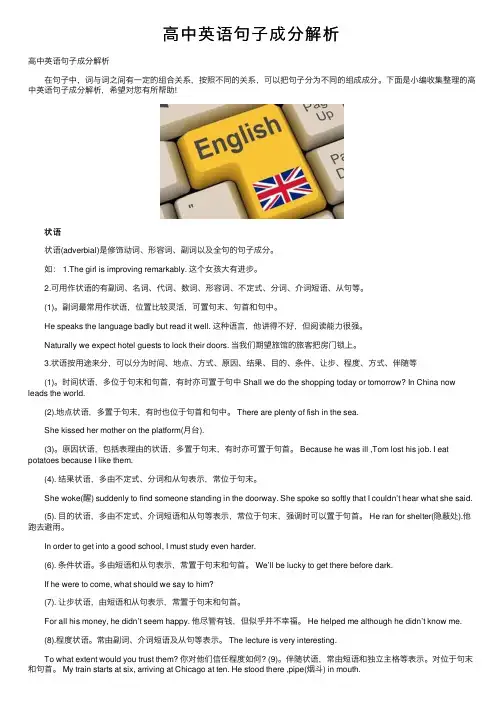
⾼中英语句⼦成分解析⾼中英语句⼦成分解析 在句⼦中,词与词之间有⼀定的组合关系,按照不同的关系,可以把句⼦分为不同的组成成分。
下⾯是⼩编收集整理的⾼中英语句⼦成分解析,希望对您有所帮助!状语 状语 状语(adverbial)是修饰动词、形容词、副词以及全句的句⼦成分。
如: 1.The girl is improving remarkably. 这个⼥孩⼤有进步。
2.可⽤作状语的有副词、名词、代词、数词、形容词、不定式、分词、介词短语、从句等。
(1)。
副词最常⽤作状语,位置⽐较灵活,可置句末、句⾸和句中。
He speaks the language badly but read it well. 这种语⾔,他讲得不好,但阅读能⼒很强。
Naturally we expect hotel guests to lock their doors. 当我们期望旅馆的旅客把房门锁上。
3.状语按⽤途来分,可以分为时间、地点、⽅式、原因、结果、⽬的、条件、让步、程度、⽅式、伴随等 (1)。
时间状语,多位于句末和句⾸,有时亦可置于句中 Shall we do the shopping today or tomorrow? In China now leads the world. (2).地点状语,多置于句末,有时也位于句⾸和句中。
There are plenty of fish in the sea. She kissed her mother on the platform(⽉台). (3)。
原因状语,包括表理由的状语,多置于句末,有时亦可置于句⾸。
Because he was ill ,Tom lost his job. I eat potatoes because I like them. (4). 结果状语,多由不定式、分词和从句表⽰,常位于句末。
She woke(醒) suddenly to find someone standing in the doorway. She spoke so softly that I couldn’t hear what she said. (5). ⽬的状语,多由不定式、介词短语和从句等表⽰,常位于句末,强调时可以置于句⾸。
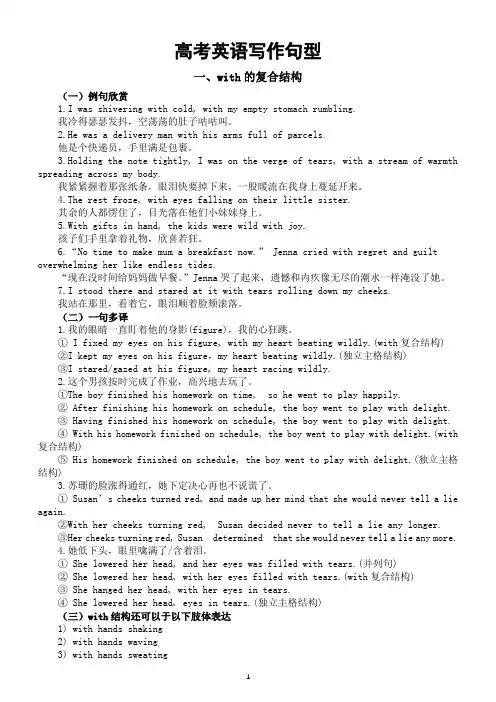
高考英语写作句型一、with的复合结构(一)例句欣赏1.I was shivering with cold, with my empty stomach rumbling.我冷得瑟瑟发抖,空荡荡的肚子咕咕叫。
2.He was a delivery man with his arms full of parcels.他是个快递员,手里满是包裹。
3.Holding the note tightly, I was on the verge of tears, with a stream of warmth spreading across my body.我紧紧握着那张纸条,眼泪快要掉下来,一股暖流在我身上蔓延开来。
4.The rest froze, with eyes falling on their little sister.其余的人都愣住了,目光落在他们小妹妹身上。
5.With gifts in hand, the kids were wild with joy.孩子们手里拿着礼物,欣喜若狂。
6.“No time to make mum a breakfast now.” Jenn a cried with regret and guilt overwhelming her like endless tides.“现在没时间给妈妈做早餐。
”Jenna哭了起来,遗憾和内疚像无尽的潮水一样淹没了她。
7.I stood there and stared at it with tears rolling down my cheeks.我站在那里,看着它,眼泪顺着脸颊滚落。
(二)一句多译1.我的眼睛一直盯着他的身影(figure),我的心狂跳。
① I fixed my eyes on his figure, with my heart beating wildly.(with复合结构)②I kept my eyes on his figure,my heart beating wildly.(独立主格结构)③I stared/gazed at his figure, my heart racing wildly.2.这个男孩按时完成了作业,高兴地去玩了。
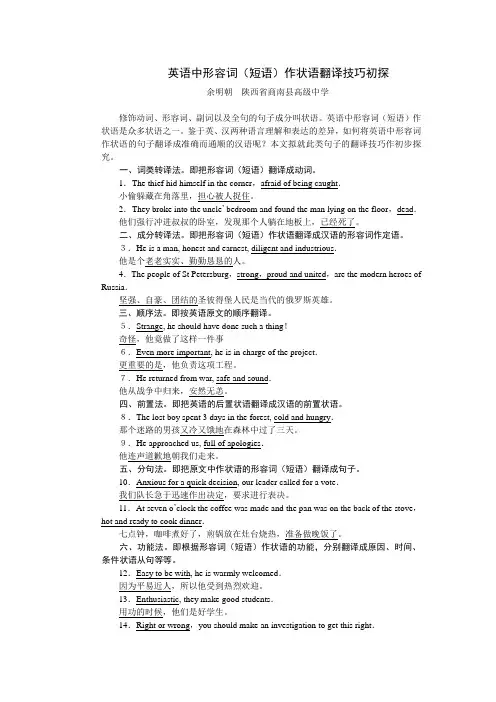
英语中形容词(短语)作状语翻译技巧初探余明朝陕西省商南县高级中学修饰动词、形容词、副词以及全句的句子成分叫状语。
英语中形容词(短语)作状语是众多状语之一。
鉴于英、汉两种语言理解和表达的差异,如何将英语中形容词作状语的句子翻译成准确而通顺的汉语呢?本文拟就此类句子的翻译技巧作初步探究。
一、词类转译法。
即把形容词(短语)翻译成动词。
1.The thief hid himself in the corner,afraid of being caught.小偷躲藏在角落里,担心被人捉住。
2.They broke into the uncle’ bedroom and found the man lying on the floor,dead.他们强行冲进叔叔的卧室,发现那个人躺在地板上,已经死了。
二、成分转译法。
即把形容词(短语)作状语翻译成汉语的形容词作定语。
3.He is a man, honest and earnest, diligent and industrious.他是个老老实实、勤勤恳恳的人。
4.The people of St Petersburg,strong,proud and united,are the modern heroes of Russia.坚强、自豪、团结的圣彼得堡人民是当代的俄罗斯英雄。
三、顺序法。
即按英语原文的顺序翻译。
5.Strange, he should have done such a thing!奇怪,他竟做了这样一件事6.Even more important, he is in charge of the project.更重要的是,他负责这项工程。
7.He returned from war, safe and sound.他从战争中归来,安然无恙。
四、前置法。
即把英语的后置状语翻译成汉语的前置状语。
8.The lost boy spent 3 days in the forest, cold and hungry.那个迷路的男孩又冷又饿地在森林中过了三天。
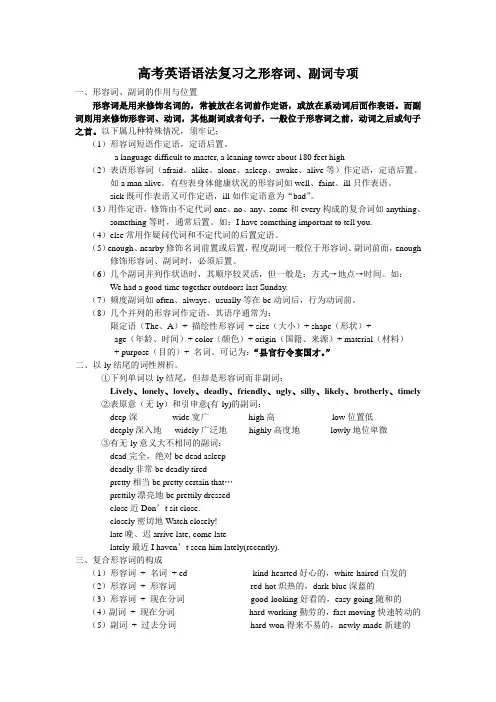
高考英语语法复习之形容词、副词专项一、形容词、副词的作用与位置形容词是用来修饰名词的,常被放在名词前作定语,或放在系动词后面作表语。
而副词则用来修饰形容词、动词,其他副词或者句子,一般位于形容词之前,动词之后或句子之首。
以下属几种特殊情况,须牢记;(1)形容词短语作定语,定语后置。
a language difficult to master, a leaning tower about 180 feet high(2)表语形容词(afraid、alike、alone、asleep、awake、alive等)作定语,定语后置。
如a man alive。
有些表身体健康状况的形容词如well、faint、ill只作表语。
sick既可作表语又可作定语,ill如作定语意为“bad”。
(3)用作定语,修饰由不定代词one、no、any、some和every构成的复合词如anything、something等时,通常后置。
如:I have something important to tell you.(4)else常用作疑问代词和不定代词的后置定语。
(5)enough、nearby修饰名词前置或后置,程度副词一般位于形容词、副词前面,enough 修饰形容词、副词时,必须后置。
(6)几个副词并列作状语时,其顺序较灵活,但一般是:方式→地点→时间。
如:We had a good time together outdoors last Sunday.(7)频度副词如often、always、usually等在be动词后,行为动词前。
(8)几个并列的形容词作定语,其语序通常为:限定语(The、A)+ 描绘性形容词+ size(大小)+ shape(形状)+age(年龄、时间)+ color(颜色)+ origin(国籍、来源)+ material(材料)+ purpose(目的)+ 名词。
可记为:“县官行令宴国才。
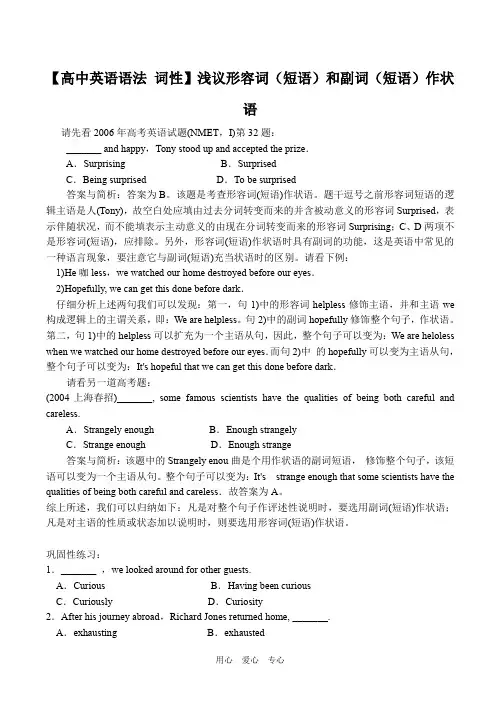
【高中英语语法词性】浅议形容词(短语)和副词(短语)作状语请先看2006年高考英语试题(NMET,I)第32题:_______ and happy,Tony stood up and accepted the prize.A.Surprising B.SurprisedC.Being surprised D.To be surprised答案与简析:答案为B。
该题是考查形容词(短语)作状语。
题干逗号之前形容词短语的逻辑主语是人(Tony),故空白处应填由过去分词转变而来的并含被动意义的形容词Surprised,表示伴随状况,而不能填表示主动意义的由现在分词转变而来的形容词Surprising;C、D两项不是形容词(短语),应排除。
另外,形容词(短语)作状语时具有副词的功能,这是英语中常见的一种语言现象,要注意它与副词(短语)充当状语时的区别。
请看下例:1)He咖less,we watched our home destroyed before our eyes.2)Hopefully, we can get this done before dark.仔细分析上述两句我们可以发现:第一,句1)中的形容词helpless修饰主语,并和主语we 构成逻辑上的主谓关系,即:We are helpless。
句2)中的副词hopefully修饰整个句子,作状语。
第二,句1)中的helpless可以扩充为一个主语从句,因此,整个句子可以变为:We are heloless when we watched our home destroyed before our eyes.而句2)中的hopefully可以变为主语从句,整个句子可以变为:It's hopeful that we can get this done before dark.请看另一道高考题:(2004上海春招)_______, some famous scientists have the qualities of being both careful and careless.A.Strangely enough B.Enough strangelyC.Strange enough D.Enough strange答案与简析:该题中的Strangely enou曲是个用作状语的副词短语,修饰整个句子,该短语可以变为一个主语从句。
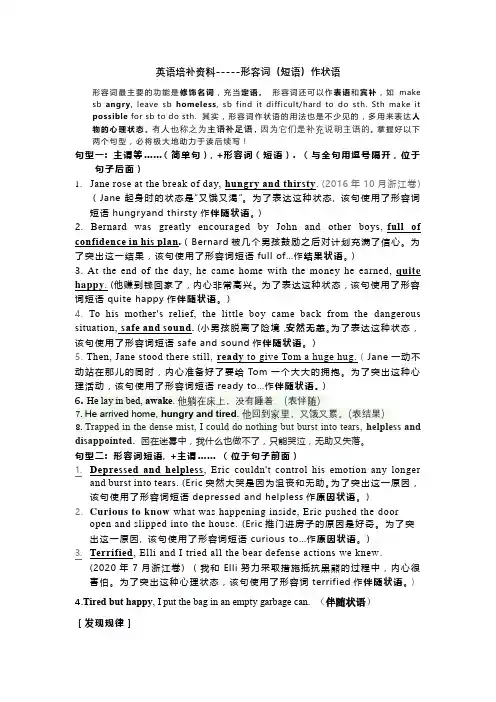
英语培补资料-----形容词(短语)作状语形容词最主要的功能是修饰名词,充当定语。
形容词还可以作表语和宾补,如make sb angr y, leave sb homeless, sb find it difficult/hard to do sth. Sth make it possible for sb to do sth. 其实,形容词作状语的用法也是不少见的,多用来表达人物的心理状态。
有人也称之为主语补足语,因为它们是补充说明主语的。
掌握好以下两个句型,必将极大地助力于读后续写!句型一: 主谓等……(简单句), +形容词(短语). (与全句用逗号隔开,位于句子后面)1.Jane rose at the break of day,hungry and thirsty.(2016年10月浙江卷)(Jane起身时的状态是“又饿又渴”。
为了表达这种状态, 该句使用了形容词短语hungryand thirsty作伴随状语。
)2. Bernard was greatly encouraged by John and other boys,full of confidence in his plan.(Bernard被几个男孩鼓励之后对计划充满了信心。
为了突出这一结果,该句使用了形容词短语full of…作结果状语。
)3. At the end of the day, he came home with the money he earned,quite happy. (他赚到钱回家了,内心非常高兴。
为了表达这种状态,该句使用了形容词短语quite happy作伴随状语。
)4. To his mother's relief, the little boy came back from the dangerous situation,safe and sound.(小男孩脱离了险境,安然无恙。
为了表达这种状态,该句使用了形容词短语safe and sound作伴随状语。
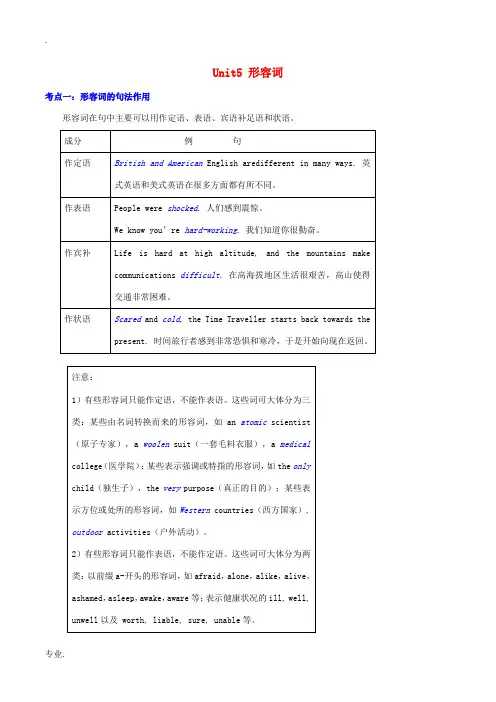
Unit5 形容词考点一:形容词的句法作用形容词在句中主要可以用作定语、表语、宾语补足语和状语。
考点二:多个形容词的排列顺序形容词作定语通常放在所修饰的名词前,若有几个形容词,一般则按照以下顺序排列:限定词→数词→描绘词(大小,长短,形状,新旧,颜色)→出处(国籍,产地)→材料→用途→名词a small round table 一张小圆桌子a dirty old red skirt 一条脏的旧红裙子a fine little old stone bridge 一座漂亮的古老小石桥ten large black plastic bags 十只黑色的大塑料袋the first Chinese astronaut 第一个中国宇航员such a pretty little wooden garden chair 这么漂亮的花园用的小木椅子考点四:形容词的比较级和最高级形容词有三个等级:原级、比较级和最高级,统称为“比较等级”。
1. 形容词比较级和最高级的构成(1)规则形式单音节形容词和少数双音节形容词是在原级后加-er,-est构成,多音节和其他双音节词是在词前加more, most构成。
构成方式见下表:注意:1)glad, fond, tired, pleased, shy等单音节词,常在词前加more和most构成比较级和最高级,如:more glad / pleased; most glad / pleased。
2)less和least也可用来构成比较等级,表示“较不…”和“最不…”,如less dangerous(较不危险的),least dangerous(最不危险的)。
(2)不规则形式英语里有些形容词的比较级和最高级是不规则的,需要逐个记忆,详见下表:注:1)few常用规则的比较等级fewer和fewest,但在当代英语里也可以用less和least。
2) elder和eldest在英国英语里表示年长关系,而美国英语却用older 和oldest。
形容词及其短语作状语英语中,用来作状语的,最常见的就是副词,有时候,形容词及其短语也可充当状语。
形容词或形容词短语作状语,用来描述谓语动作,说明谓语动作发生的时间、原因、条件或伴随的情况,也可表示让步和结果,有时前面可以加上某些从属连词,进一步表明状语的性质。
形容词或形容词短语作状语时,大多用逗号与全句分开,位置可在句首、句中或句末。
1、时间:Don’t marry young. 不要早婚。
When seriously ill, my grandmother usually drank the Chinese medicine to the very last drop .病得严重时,奶奶每次喝中药都是喝得一滴不剩。
There is no cure available for the disease and AIDS patients have to deal with the fact that they might die young. 这种病没有切实有效的治疗方法,爱滋病病人必须面对这个事实:他们可能年纪轻轻就会死去。
Learn young, learn fair.学习趁年轻,要学就学好。
Enthusiatic, they are quite co-operative. 热心的时候他们是很合作的。
2、原因:Hungry, she hurried to the kitchen. 她感到很饿,就匆匆地去了厨房。
Eager for an immediate reply, he sent me another email.渴望立刻得到答复,他又给我发了一封电子邮件。
Sad and unhappy, cold and wet ,Lear became mad.悲伤不快,又湿又冷,利尔疯了。
Confused and a little concerned, the minister asked, “Carl, what are you doing?”牧师感到非常纳闷,于是略带一些关心地问道:“卡尔,你在干什么?”Overjoyed, she dashed out of the house. 他非常高兴,急步跑出屋子。
高中英语语法(形容词和副词篇)位置与用法adj. 修饰n.或pron. 作定语,单个adj.放在其前(短语放在其后),修饰不定代词(不定副词)放在其后,常跟在连系V.(be, look, sound, smell,taste, feel,get, become, turn, prove...)后作表语(sounds good),也可在n./pron. 后作宾补(make him angry)或者主补(Tom was born smart.),形容词还作状语通常说明主语的情况,主要表示原因、伴随或方式,可位于句首、句中和句末,Hot and wet, you couldn’t imagine the climate her in summer.She was lying in bed, awake.形容词可与定冠词连用,相当于一个名词,泛指一类人或事物。
The beautiful is not always the same as the good.; adv.作状语,修饰v. 放在其后(eat well, run quickly,choose carefully),修饰adj.adv,放在其前(really talented),但是enough要放在所修饰词的后面(old enough)。
修饰整个句子,放在句首(Thankfully, I managed to get through the game and the pain was worth it in the end.)。
而频率副词修饰动词时要放在助动词/be/情态动词后,实意动词前。
如: He is never late for class. He never arrives late for class.地点副词、时间副词常放在句末;疑问副词(when, where, why, how)放在句首;连接副词/关系副词引导从句,放在从句前。
高中英语知识点归纳形容词短语的构成与用法形容词短语是英语中常用的修饰语,用于描述和限定名词。
掌握形容词短语的构成和用法对于理解和运用英语非常重要。
本文将对高中英语中常用的形容词短语进行归纳、总结和讲解,以帮助学生更好地掌握和运用这些知识点。
一、形容词短语的构成形容词短语通常由形容词和副词构成,形容词在修饰名词时可以借助副词来增强其修饰能力和表达方式。
下面是一些常见的形容词短语构成方式:1. 形容词 + 名词如:a beautiful girl(一个漂亮的女孩)2. 形容词 + 不定式如:an exciting book to read(一本令人激动的书)3. 形容词 + 分词如:a broken window(一个破碎的窗户)4. 形容词 + of + 名词如:an example of great importance(极其重要的例子)5. 形容词 + in + 名词如:a city rich in history(历史悠久的城市)6. 形容词 + with + 名词如:a man with long hair(长发的男人)7. 形容词 + to + 不定式如:an easy task to complete(容易完成的任务)二、形容词短语的用法形容词短语可以在句子中担任多种语法角色,包括作主语、宾语、表语、定语和状语等。
下面将分别对这些用法进行详细讲解:1. 形容词短语作主语形容词短语作主语时,通常位于句首,用来描述或指代一个人或物。
例如:- Exciting adventures are always fascinating.(令人激动的冒险总是迷人的。
)- Learning a new language is challenging.(学习一门新语言是具有挑战性的。
)2. 形容词短语作宾语形容词短语可以作及物动词或介词的宾语,用来修饰宾语。
例如: - I find this book very interesting.(我觉得这本书很有趣。
.实用文档.形容词作状语形容词在句中作定语、表语和宾语补足语的情况很多, 但作状语的时候也不少。
如: The bag fell on the floor and broke open. 袋子掉到地上摔破了。
Glad to accept, the girl nodded her agreement. 这姑娘乐于接受, 点头表示同意。
形容词〔短语〕作状语时, 通常说明主语的情况, 即表示主语的状态、性质、特征等, 有时它和宾语的关系密切, 且可位于句首、句末和句子中间, 通常和句子的其它局部用逗号分开, 但单个形容词可以连在一起。
一、形容词〔短语〕作状语说明主语的情况, 可以表示动作或状态发生的原因、方式、时间或伴随等, 或对谓语作补充说明。
1. 表示原因, 但原因意义不很突出, 有时是并列的。
例如:Afraid of difficulty, he prefers to do the easy maths problem. 他害怕困难, 宁愿做容易的数学题。
Anxious for a quick decision, our leader called for a vote. 我们队长急于迅速作出决定, 要求进行表决。
2. 表示方式或伴随。
例如:The lost boy spent three days in the forest cold and hungry. 那个迷路的男孩又冷又饿地在森林中过了三天。
The moon had just risen, very golden, over the hill. 月亮刚刚升起, 挂在山上, 十足的金黄色。
3. 形容词〔短语〕作状语时, 它和句中谓语动词在意义上的联系不密切, 只是对谓语补充说明。
Effective the first of October, our supermarket will close at eleven. 我们超市十一点关门, 从十月一日起生效。
形容词及其短语作状语英语中,用来作状语的,最常见的就是副词,有时候,形容词及其短语也可充当状语。
形容词或形容词短语作状语,用来描述谓语动作,说明谓语动作发生的时间、原因、条件或伴随的情况,也可表示让步和结果,有时前面可以加上某些从属连词,进一步表明状语的性质。
形容词或形容词短语作状语时,大多用逗号与全句分开,位置可在句首、句中或句末。
1、时间:Don’t marry young. 不要早婚。
When seriously ill, my grandmother usually drank the Chinese medicine to the very last drop .病得严重时,奶奶每次喝中药都是喝得一滴不剩。
There is no cure available for the disease and AIDS patients have to deal with the fact that they might die young. 这种病没有切实有效的治疗方法,爱滋病病人必须面对这个事实:他们可能年纪轻轻就会死去。
Learn young, learn fair.学习趁年轻,要学就学好。
Enthusiatic, they are quite co-operative. 热心的时候他们是很合作的。
2、原因:Hungry, she hurried to the kitchen. 她感到很饿,就匆匆地去了厨房。
Eager for an immediate reply, he sent me another email.渴望立刻得到答复,他又给我发了一封电子邮件。
Sad and unhappy, cold and wet ,Lear became mad.悲伤不快,又湿又冷,利尔疯了。
Confused and a little concerned, the minister asked, “Carl, what are you doing?”牧师感到非常纳闷,于是略带一些关心地问道:“卡尔,你在干什么?”Overjoyed, she dashed out of the house. 他非常高兴,急步跑出屋子。
Strong, proud and united, the people of St Petersburg are the modern heroes of Russia.圣彼得堡的人民坚强、自豪、团结一致,他们是当代的俄罗斯英雄。
Helpless, we watched our home destroyed before our eyes.我们束手无策,只能眼睁睁地看着自己的家园被毁掉。
Modest and easy to approach, he soon put everyone completely at ease.他是那样谦虚、平易近人,很快使大家放松下来。
Much interested, he agreed to give it a try.他很感兴趣,答应试一试。
Intrigued, the prince picked the first doll and put the string into the ear. It came out from the other.王子来了兴致,拿起第一个布娃娃,把线穿了进去,线从另一个耳朵里出来了。
The students, surprised at the way the questions were put, didn’t know the answers to them.学生们对提出这些问题的方式感到吃惊,找不到它们的答案。
Angry at the girl oversleeping, Mr Green went down to wake her up.格林先生下去叫醒她,是因为她睡过了头惹恼了他。
Lin Tao, glad to accept the suggestion, nodded his agreement.因为林涛很乐意接受这个建议,所以他就点头同意了。
The mother sneaked out of the room, fearful of waking the baby up.母亲悄悄地走出房间,怕惊醒了婴儿。
The latter, astonished, turning round with all the pride of an emperor, said, “Sir, I am a corporal!”后者很是吃惊,转过身,无比自豪地说道:“先生,我是下士!”The people of the town felt very sorry when they saw this small boy, completely blind, feeling his way along the streets with his cane in order to find his way.城里的人看到这个小孩儿都觉得可怜,由于看不见,他还得用拐杖试探着才能找到路。
Of course, the perfect pot was proud of its accomplishments, perfect to the end for what it was made to do.自然,好罐为自己的成就感到骄傲,因为让它做的它都做得尽善尽美。
I began to really look forward to the next one, interested to see what this author would come up with next.我从内心里真的开始盼着下一张卡片的到来,因为我想看一看作者下一次都提供些什么精彩内容。
Delighted, I jumped into the car and speeded off.我兴高采烈地跳上汽车,一溜烟儿开跑了。
Willing to do it, the girl nodded her agreement.由于愿意做这件事,那女孩点头表示同意。
Guide dogs were first trained after World War I when many soldiers returned home sightless.一战之后许多士兵由于失去视力而返回家园,这时候开始了对导盲犬的训练。
A traveler once visited a city where everyone wore blue. Puzzled, he went to a dyer and said, “Please dye this handkerchief red.”一位旅行者参观了一座城市,那儿的人都穿蓝色衣服。
他对此感到迷惑不解,就到一个染工那儿,说:“请把这个手帕染成红的。
”Greatly surprised, I read diary after diary, each expressing a similar theme.极度惊讶之中,我一篇接一篇地看着日记,每一篇表现的主题都很相似。
I am always an unwilling traveler, homesick for familiar surroundings.我一向是不愿外出旅行的人,留恋熟悉的环境。
Unemployed, tired of reading, and weary of grieving the loss of my mother, I’d gone into woods to forget. 由于没有工作,也无心读书,更厌倦了沉溺于失去母亲的悲哀之中,我于是隐入丛林,试图忘怀这一切。
She approached us full of beans. 他神采奕奕地向我们走过来。
Afraid of being scolded, for a moment, little Franz thought of playing truant.因为害怕挨骂,小弗朗兹一时起了逃学的念头。
Old and slow, she was not in time for the bus.她年纪大,行动迟缓,没能赶上公共汽车。
Desperate for money, he tried to persuade Rachel to marry him, but when she changed her mind, he had no choice but to go abroad to sell the diamond. 由于急需用钱,所以他竭力说服雷切尔同他结婚。
但是当她改变主意后,他没招了,只得出国去把钻石卖掉。
For a moment I held my breath, not sure how my son would react. 我一下子屏住了呼吸,不敢确定我儿子会有什么反应。
In the boat she felt helpless, unable to move around, sitting in one spot. 她在船上感到很无助,只能坐在一个地方,没法四处走动。
“That was a narrow escape!” said Alice, a good deal frightened at the sudden change, but very glad to find herself still in existence. “差一点儿没躲过!”爱丽丝说,她被这个突然变化吓得不轻,但也非常庆幸自己没有消失。
“Oh, I beg your pardon!” cried Alice hastily, afraid that she had hurt the poor animal’s feelings. “I quite forgot you didn’t like cats.”“哦,真是对不起!”爱丽丝匆忙大叫道,深恐伤了这个可怜的小动物的心,“你不喜欢猫,瞧我这记性。
”Short and shy, Ben Saunders was the last kid in his class picked for any sports team. 本·桑德斯个头儿又矮又腼腆,哪个运动队都不愿意接受他。
Angry, I stamped to my seat without a word. 由于生气,我一句话没说就跺着脚回到了座位上。
The thief hid himself in the corner, afraid of being caught. 小偷躲在角落里,害怕被抓。